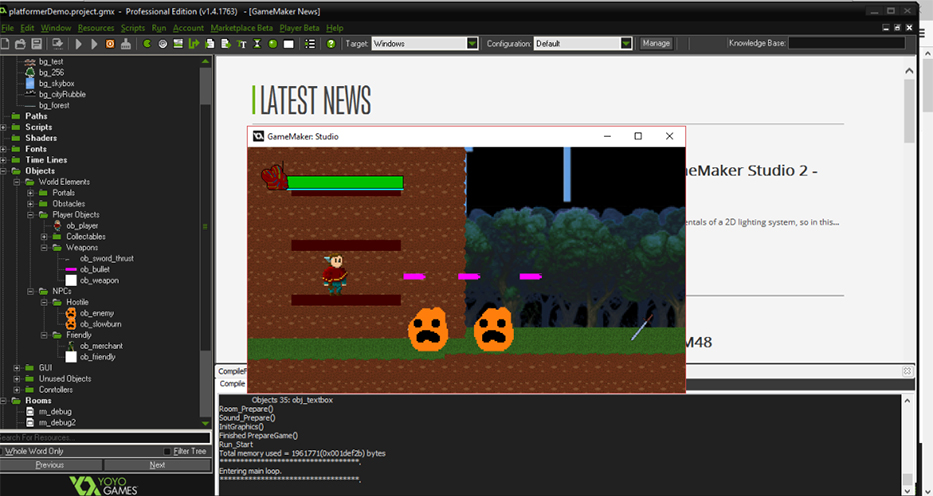As a child, creating video games seemed like something very very difficult, far from the reach of the layman – something that would take decades of practice, lots of money, and lots of luck. And certainly, creating a good game still takes extraordinary skill not only from one person but from a whole team. But here I am, still in college, with only novice knowledge in C++ and decent knowledge in C, putting together test games that once would have taken people dozens of hours.
I’m not chiefly a game designer; I’m mainly educated in fiction writing, with only some dabbling in programming. I will take a college course in Unity eventually, but it’s a high-level course, and do I want to wait until I’m nearly graduated to begin designing? That would be a disaster; the game industry is partially an art industry, and like any art industry finding employment or getting your product out there usually requires you to have released some amateur work first. My savior: GameMaker Studio.
Baby Steps

A look GameMaker Studio; simple code and drag-and-drop commands are integrated for an easy build.
GameMaker Studio redirects where the effort of a game needs to go. If you can draw the art or know someone who can, then you can make a pretty decent game in GameMaker Studio. You need to learn the built-in code system, sure, but it isn’t horribly complex and a lot of it is pretty self-explanatory. The slight coding education I’ve had does grate a little at some features of the system; it’s far from perfect, especially from an engineering standpoint. But it’s cheap (I got GameMaker Studio Pro for $20 thanks to Humble Bundle), it’s constantly improving, and it’s easy to learn. The thought of completing a solid game within the span of a summer, with just three or four people, is really revolutionary.
Is GameMaker Studio a substitute for more code-based engines? Absolutely not. It can create pretty much anything you could want in a 2D game, but beyond that it’s not capable of much else, and some aspects are unreasonably difficult (our chief programmer spent a lot of time and tears trying to put together a grid-based inventory). But as a tool for transitioning to more complex engines and for getting your first hands-on design experience, it’s a godsend.
Could I teach myself Unity? Of course, and I plan to do so. But GameMaker Studio lets me experience the rhythm of being a game designer, and allows me to spend more time on the creative side of the game rather than the technical issues. In addition, you can just as well write your game in a code-extensive manner using GameMaker Studio (as opposed to using more of their drag-and-drop options), though their coding system is a bit wacky. Starting off with the pre-developed approach and then trying to convert it into more code-based development is a really effective way to learn how code can translate into game.
How Will this Change the Future of Games?
Now you ask “So what? Who cares?” Well, the new Indie movement has been rocketing forward for years now. There’s no doubt that GameMaker Studio’s continued development will just add fuel to the fire, and possibly expand the industry more than any other engine, because of how much it backstages the actual coding processes behind the game. It’s already resulted in several explosively popular games, the biggest example being Undertale.
There are concerns, however, that the fact that GameMaker Studio “simplifies” game making will make the games that come out of it cheaper, lazier, and as a whole not as well developed. Concerns about competition in the industry are also frequently waved about; it’s already a fiercely competitive field, so if every artist out there can suddenly join in on the fun, things might get out of hand.
Like I said before, I’m chiefly a writer, so I myself fall into that “every artist” category. Five or ten years ago, someone with my education wouldn’t have stood a chance in this industry, not without a team of programmers and artists supporting me. But now I have an entry point, now I have a way in, a way to bring knowledge to the gaming industry that otherwise might never have made it there; sure, we’re going to get an onslaught of lazy games from these developments, but we’re going to get an onslaught of really innovative games too, and the industry is going to grow and learn like never before.
Until recently I’d given up my dreams of game design and settled for writing stories, books, maybe looking for a career in film. But games are starting to collide heavily with the film arts (that’s a whole other article) and with only two or three friends I can make games as good as a team of twenty might have made years ago.

New Players, New Knowledge
My final kick came when discussing with some friends how underdeveloped games seemed to become in a fictional writing sense; there’s a trade-off between how big and how populated the world is, and how unique the various characters are, and also a trade-off between how many quests and questline options you include and how developed each outcome is.
Skyrim is a good example; although it certainly did a fantastic job pushing the boundaries of open worlds in many ways, there have been constant complaints that as a whole the characters are lackluster, the questlines are entertaining but not quite fulfilling, and that many quest lines are horribly underdeveloped.
My personal biggest grievance, as a specific example, being that taking down the Dark Brotherhood is ridiculously easy, completely un-rewarding (a measly few thousand gold, compared to 30,000+ and several items if you join them), and lacking any notably developed progression whatsoever. I actually really enjoyed their main quest series, so I’d hoped taking them down would give me an equally enjoyable and emotional experience.
Nope. It’s basically a void choice. You run in, you kill them, you get your reward, end of story. Why even give us the choice if it’s going to be such a dull and unfulfilling experience? I’m sure many of you have also heard the complaints about being unable to take down the Thieves’ Guild. So despite Skyrim’s accomplishments, it has a long way to go in terms of good fiction writing.
So we (a writer, a musician, a marketer, and two and a half programmers) decided to do better. Ten years ago we’d have only joked about such a thing. But thanks to technology like GameMaker Studio, we’re well on our way to bringing our ideas to the industry, just like many other writers and artists. If we can move ourselves up from this starting point, I could bring my education in fiction writing to our games, something that would not normally be done to a very strong degree.
So I say thank you GameMaker Studio, for giving me this chance. You’re a pain in the ass sometimes but without you I wouldn’t even have a shot.









